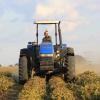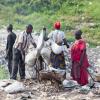
To feed Africa’s growing population, agricultural-food systems need to be modernized. In a new study, researchers analyzed how continental free trade and agricultural development could ensure sustainable food security for Africa.
Currently, about one-fifth of Africa's population lacks sufficient food for good health. Much of the continent’s food supply is dependent on international imports, which poses risks due to the uncertainty of global food markets. Past efforts to upscale agricultural production in Africa relied mainly on establishing new croplands instead of intensifying yield, leading to environmental degradation, and increasing greenhouse gas emissions. As the continent’s population is projected to double by 2050, finding a sustainable solution to meet the increasing food demand is essential.
The modernization and regional integration of agricultural-food systems is a possible solution for eliminating hunger, ensuring sustainable production growth, and inducing broader economic transformation in Africa. To identify the best ways to bring about these developments and assess potential barriers, an international research team led by KU Leuven and IIASA analyzed the potential impacts of two critical developments—continental trade integration and local agricultural development.
In the study published in Nature Food, the team used the IIASA Global Biosphere Management Model (GLOBIOM) to model agriculture, forestry, and bioenergy sectors across eight African regions. They analyzed several different scenarios including an agricultural development scenario, where crop yield is intensified and the costs of local trade are reduced, as well as a scenario where free trade within the continent is established.
“Our paper sets new frontiers in food systems research,” says study lead author, Charlotte Janssens, a researcher at KU Leuven and a guest researcher in the IIASA Integrated Biosphere Futures Research Group. “Previous studies have either focused on continental trade effects or the sustainability impacts of agricultural development. Our study investigates both components in a consistent modeling framework.”
The team found that free trade alone will not help solve the issue of hunger and greenhouse gas emissions, as trade integration will mostly just lead to the relocation of production. However, under the agricultural development scenario, Africa’s trade balance with the rest of the world improved, and undernourishment was almost fully eliminated by 2050. The associated land-use changes still led to a slight increase in greenhouse gas emissions which would need to be compensated by careful policy design.
“Our contribution is especially timely given that the African Continental Free Trade Area (AfCFTA) landmark agreement entered into force in 2021, and its national implementation strategies are currently unfolding all across the continent,” says Janssens.
When the researchers combined free trade with agricultural development, they found that the reduction in outside food imports was further enhanced, and production and trade gains were more equally distributed across African regions. In light of this, the results of the study will hopefully guide policymakers to focus on investments in agricultural development along with the current trade integration.
“Overall, we demonstrate that aligning continental free trade and local agricultural development policies will be crucial to simultaneously achieve trade, food security, and climate objectives. Close cooperation between the policy areas of African trade is therefore crucial,” concludes study author Petr Havlik, who leads the Integrated Biosphere Futures Research Group at IIASA.
Reference
Janssens, C., Havlík, P., Boere E., Palazzo, A., Mosnier, A., Leclère, D., Balkovic, J., Maertens, M. (2022). A sustainable future for Africa through continental free trade and agricultural development. Nature Food DOI:10.1038/s43016-022-00572-1 [pure.iiasa.ac.at/18163/]
News

05 November 2024
Women's education influences fertility rates in sub-Saharan Africa

02 September 2024
IIASA-led research lauded with Outstanding Article Award

15 April 2024


